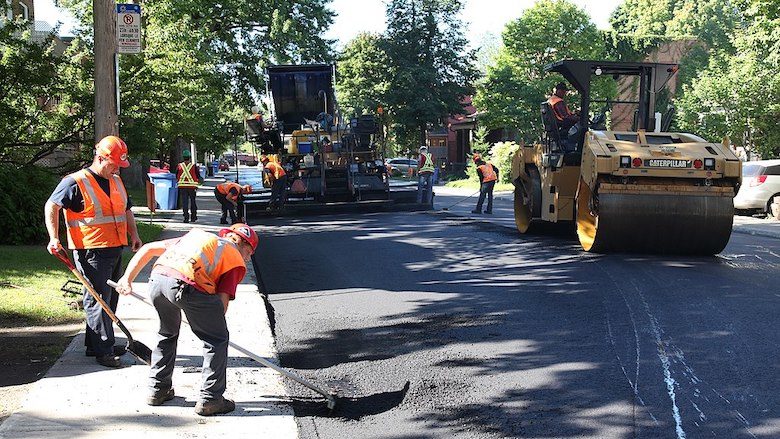States
The EEOC Files A Racial Discrimination And Harassment Lawsuit Against Asphalt Paving Systems

The EEOC Files has sued Asphalt Paving Systems, Inc. (APS), a significant asphalt paving firm in numerous states. The action, filed in the U.S. District Court for the Middle District of Florida, alleges that APS violated federal law by harassing and discriminating against Black workers, exposing an alarming incidence of workplace racism.
According to the complaint, 12 Black employees who had previously filed charges with the EEOC and other Black employees were subjected to a hostile work environment characterized by the open use of racial slurs and derogatory comments, including the “n-word.” Demeaning working circumstances included being refused breaks while their white counterparts slept and forced to use outside facilities while their white counterparts had indoor bathrooms.
The Complaint Also Claims That Aps Prohibited An African-american Paving Crew From Applying For Other Jobs By Advising Against It.
The EEOC’s complaint indicates a solid opposition to workplace racial discrimination, which is prohibited under Title VII of the Civil Rights Act of 1964. The EEOC Regional Attorney, Robert E. Weisberg, criticized the alarming claims, highlighting the pervasiveness of workplace racial discrimination. He promised that the EEOC would fight for Black workers’ ability to work without prejudice.
EEOC Tampa Field Office Director Tamra S. Schweiberger criticized APS for creating a hostile workplace with racial statements and humiliating treatment of African American workers. She stressed the need to stop such reprehensible conduct and the EEOC’s dedication to prosecute Title VII breaches to protect Black workers’ rights.
The Miami District Office of the EEOC, which includes the Miami, Tampa, and San Juan offices, serves Florida, Puerto Rico, and the U.S. Virgin Islands and promotes workplace equity and fairness.
EEOC Files: Racism And Workplace Hostility
The U.S. Equal Employment Opportunity Commission (EEOC) lawsuit against Asphalt Paving Systems, Inc. shows that workplace racism persists. The case in the U.S. District Court for the Middle District of Florida details the harrowing experiences of Black workers who faced racial discrimination and a hostile workplace. APS staff and management used racist obscenities, including the “n-word,” according to shocking accounts. Black workers were denied breaks while their white colleagues enjoyed them and had to use outside facilities while white employees had indoor conveniences, which worsened the hostile climate. These heinous crimes violated federal law and highlighted the worrisome prevalence of racism in workplaces, requiring a solid response.
Read Also: Desantis Refuses African American Studies Course, Sparking Outrage
Systemic Issues For Black Employees
The EEOC case against APS highlights systematic issues and disadvantages encountered by Black workers. Already oppressed by institutional racism, these people were mistreated in their workplace. The shocking facts imply that APS intentionally discouraged Black people from working by contacting prospective employers and recommending them against employing them, making it harder for them to find other jobs. Such discriminatory practices hinder Black professionals’ professional growth and prolong a cycle of disadvantage and prejudice, emphasizing the need to end systemic racism in the workplace and beyond.
Fighting Workplace Discrimination And Equal Rights
Despite the grave accusations in the APS case, the EEOC has reaffirmed its commitment to protecting Black workers’ rights and fighting workplace racial discrimination. Even 60 years after Title VII of the Civil Rights Act of 1964 was passed, EEOC Regional Attorney Robert E. Weisberg stressed the necessity to address racial discrimination in employment. He stressed the agency’s commitment to Black workers’ freedom from discrimination. The EEOC’s Tampa Field Office Director, Tamra S. Schweiberger, condemned APS’s reprehensible actions and vowed to vigorously prosecute Title VII violations to protect Black workers’ rights and prevent workplace racial discrimination.
Long-term Effects On Employee Well-being And Workplace Culture
The ramifications of racism inside the workplace extend well beyond the acute abuse experienced by the affected individuals. Hostile discrimination may have enduring effects on victims’ emotional and physical health. Continuous exposure to racial insults and bigotry may traumatize individuals, affecting their workplace belonging and psychological safety. The poisonous atmosphere lowers employee morale and creates a culture of fear and mistrust that makes people feel vulnerable and alienated. Discrimination may also develop a culture of silence, preventing victims from seeking remedies for fear of reprisal or marginalization. Fear and silence impede inclusion and equality, which are crucial for a healthy and effective workplace.
Legal Action For Workplace Equality
The EEOC’s lawsuit against Asphalt Paving Systems, Inc. is a significant step toward workplace equality and systematic racism elimination. The case highlights the importance of regulating organizations in protecting workplace equality and fairness. The EEOC creates an important precedent by holding firms responsible for discriminatory behavior and promoting diversity, emphasizing the necessity of implementing anti-discrimination laws to safeguard vulnerable workers. This legal action seeks reimbursement for injured workers and deters other firms from discriminating. It conveys the message that racial discrimination will not be permitted and that strict steps will be taken to safeguard workers’ rights regardless of color or ethnicity.
Promoting Diversity And Inclusivity At Work
After the shocking disclosures of racial discrimination at Asphalt Paving Systems, Inc., firms must create inclusive workplaces that value diversity and employee well-being. Diversity and inclusion programs must go beyond legal compliance to meet this goal. Companies must deliberately promote a culture of respect, empathy, and understanding where all workers feel valued, respected, and empowered to share their unique viewpoints and abilities. Strong anti-discrimination rules and frequent diversity training may help create a hate-free workplace. A culture of open communication and accountability may also motivate workers to speak out against discrimination and foster a shared commitment to a more fair and inclusive workplace. Companies can create a more equitable and peaceful workplace where everyone has equal opportunity for development and success by promoting diversity and inclusiveness.
The U.S. Equal Employment Opportunity Commission’s latest construction employer lawsuit targets the Florida operations of a large multi-state paving company.
In a civil complaint filed in federal court in Tampa, the agency claims that 12 Black employees of the Tampa-area unit of Asphalt Paving Systems, based in Hammonton, N.J., were subject to a hostile work environment in violation of Title VII of the federal civil rights law.
The firm operates in three other states beside New Jersey and Florida—Pennsylvania, Georgia and Tennessee, according to its website.
According to the complaint, a Black paving crew working alongside or in close proximity to white crews were showered with frequent racial slurs by supervisors and other employees. Crew members were often referred to as “boy” or “the N-word” and made to overhear negative comments about Black people, said EEOC.
EEOC also contends that an Asphalt Paving Systems foreman would often unbutton his shirt to display a “White Pride” tattoo. Other employees wore hats and shirts displaying the Confederate flag, EEOC charged. Its complaint also alleges that white employees and supervisors at times brought guns to the jobsite.

-

 States2 weeks ago
States2 weeks agoPearlie Golden 93-Year-Old Black Woman Shot By Texas Cop
-

 States2 weeks ago
States2 weeks agoLayers Of Racial Tension The Mario Woods Tragedy And San Francisco Path To Justice
-

 States2 weeks ago
States2 weeks agoTragedy Unveils Racial Tensions Tarika Wilson Story
-

 States2 weeks ago
States2 weeks agoLynching Of Thomas Shipp Tragedy Of Racism Echoes Through History
-

 States2 weeks ago
States2 weeks agoThe Killing Of Terence Crutcher And The Fight For Racial Justice

















You must be logged in to post a comment Login